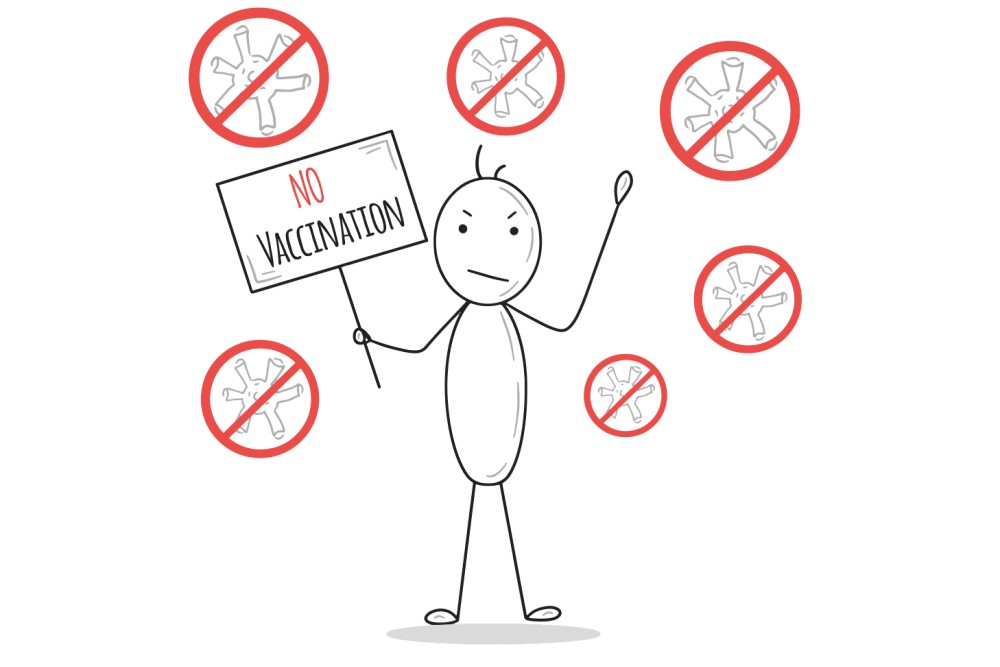On February 26th, the second-oldest Roman Catholic archdiocese in the United States issued an official statement warning church members about their COVID-19 vaccine options; in particular, it labeled the recently approved, single-dose vaccine from Johnson and Johnson “morally compromised as it uses the abortion-derived cell line in development and production of the vaccine as well as the testing.” In the following days, numerous representatives of Catholic dioceses around the country chimed in to agree, not actually forbidding the pious from being vaccinated, but rather advising that “If one has the ability to choose a vaccine, Pfizer or Moderna’s vaccines should be chosen over Johnson & Johnson’s.”
To those unfamiliar with Catholic dogma, this warning is likely peculiar: what do abortion practices (which the Roman Catholic church officially, if not pragmatically, opposes) have to do with vaccinations? But this critique of vaccines is far from unique to conservative Catholic clergymen: for some time, critics of vaccines in general have lobbied pro-life sentiments as anti-vaccination arguments: my goal here is not necessarily to respond to abortion-based anti-vaccine rhetoric, but rather to demonstrate what else that kind of thinking might require someone to believe.
In short, it’s kind of Marxist.
Let’s back up and explain some things first. The “vaccinations-are-pro-abortion” (or even the less severe “some-vaccines-are-tainted-by-abortion”) argument is rooted in the fact that several vaccines, including Johnson and Johnson’s one-shot COVID-19 treatment, have been developed, in part, by using celluar tissue taken from an aborted fetus in the 1960s. Understandably, biomedical research often requires human tissue samples for many reasons, but it can be difficult to collect and store cellular material in a way that is both efficient and effective for long-term use; typically, human cells die too quickly to be used in long-term experiments, but fetal human cells are not only inherently capable of reproducing themselves indefinitely, but scientists have developed techniques to intentionally grow them in cellular cultures in a way that effectively “immortalizes” them. So, medical researchers studying how to cure ailments ranging from Alzheimer’s Disease to spinal cord injuries to multiple kinds of cancer to, yes, diseases susceptible to vaccinations will typically rely on several immortalized cellular lines that have been cultivated for decades in order to test their experiments.
It is not the case that the Johnson and Johnson vaccine — or any other vaccine, for that matter — contains aborted fetal tissue (that is to say: absolutely no one is receiving literal fetal cells in their arm when they get their COVID shot). Nor is it the case that abortions are being done in order to develop vaccines today (each of the cell lines now in use, such as the MRC-5 and WI-38 cultures, originate in abortions performed in the mid-20th century — often for separately tragic reasons, such as the rubella epidemic of the 1960s).
But this is not to say that there are no moral questions that arise about the use of fetal cell lines (or any other human culture) in contemporary research contexts. For example, the HEK-293 line used in the development of several COVID-19 vaccines may have come from an abortion in 1973, but its exact origination is unclear and it is entirely possible that the original cells were collected from the remains of a spontaneous miscarriage. Either way, despite the fact that HEK-293 cells have been used to develop a wide variety of medical advances and medications (including many of the various antipsychotics today used to treat diseases like schizophrenia and bipolar disorder), the original donor of those cells (or their family) has never been compensated for their contribution to an industry enjoying billions of dollars of profit. Similarly, the story of Henrietta Lacks, an African-American woman diagnosed with terminal cervical cancer in 1951, is a terrible example of how biomedical research can be built on a blatant injustice: after doctors collected a sample of Lacks’ cells without her knowledge, they discovered that the cells unexpectedly possessed the same kind of propensity for “immortalization” that makes fetal cells so useful, so they patented and commercialized the “HeLa” cell line. Despite never receiving Lacks’ consent for her cells to be used in this way (much less compensating her for her donation), the HeLa line has developed into one of the most useful (and lucrative) cell cultures on the market today; Lacks’ family never even knew the cultures existed until two decades after her death.
Setting those issues aside for now, what can we make of the claim that the conditions under which a commodity is manufactured can irrevocably taint the commodity itself with immorality? This is, I take it, a core complaint of the pro-life critic of vaccine development practices: the goals of vaccine deployment might be laudable enough (namely, reducing the spread of disease), but the methods of doing so are, arguably, associated with something purportedly inexcusable. For some, the difference between contemporary abortions and contemporary immortalized fetal cell lines originating in initially-unrelated abortions a generation ago might be sufficient to distinguish morally between pro-life commitments and vaccination acceptance — that is to say, someone could easily be a critic of elective abortion and consistently still believe that modern vaccination programs are morally acceptable. (It is worth noting that several outspoken pro-life American religious leaders, including Robert Jeffress, Al Mohler, and Franklin Graham have spoken out recently in support of COVID-19 vaccination programs.)
But let’s suppose that this is inconsistent (as many of Graham’s fans argued after he publicly surmised that Jesus would be pro-vaccine); what might we be committing ourselves to if we affirm that the use of fetal cell lines in their development hopelessly entangles vaccines within a morass of morally unacceptable problems?
Firstly, it seems like we would also need to reject many additional medical advances made over the last five decades. Anyone who rejects a vaccination against the novel coronavirus (or any other disease) because of the abortion-based critique of vaccinations I’ve been discussing will seemingly also need to reject treatments for conditions ranging from various cancers, diabetes, Parkinson’s disease, and macular degeneration to Alzheimer’s, paralysis, strokes, organ transplants, and medications for a wide variety of conditions. Without some special reason to think that vaccines are uniquely susceptible to being morally tainted via their tenuous association to past abortions, it is unclear why one could be an anti-vaxxer and not also a critic of many other elements of modern medicine.
Secondly, this whole conversation reminds me of the broader Marxist critique of capitalism in general. In his essay “Estranged Labor,” Marx introduces the idea that, under capitalism, workers are alienated from multiple things, including the products of their labor, their fellow human beings, and even themselves. A society split into different class-divisions, Marx says, necessarily prevents certain people (workers) from being able to live lives as fully realized human beings, creating and enjoying both cultural artifacts and the other people within our cultural relationships. In later works, like the first volume of Capital, Marx would develop the further critique that capitalism is not only alienating but exploitative because it, by design, transfers the value created by the labor of workers to the pockets of business-owners; for one example, consider the connection between Jeff Bezos’ wealth and the often-cataloged, but rarely-prevented dehumanization of workers in Amazon distribution centers (another is the dangerous abuses regularly perpetrated against both human workers and nonhuman animal victims in factory farms). Nowadays, this critique is sometimes summarized in the sloganized observation that there exists “no ethical consumption under capitalism” — although Marx himself never wrote those words, it is a (somewhat oversimplified) distillation of his broader point: the conditions under which capitalism operates necessarily spreads a taint of moral corruption throughout the entire line of commodity production in a manner that should provoke us to rethink the structuring of that productive system as a whole.
Of course, if someone is apt to think that products are, in a sense, insulated from the moral conditions of their production, then they would be able to quickly reject the Marxist critique of capitalism. Notice that there is at least one person who can’t do this, though: the person who accepts that vaccines are necessarily morally tainted because of the conditions of their production.
In short, if someone is inclined to believe that their pro-life commitments require them to think that vaccines are morally tainted, then they are seemingly required (upon pain of inconsistency) to believe that their anti-abuse commitments will require them to believe that many additional products, including anything produced on a factory farm and, perhaps, even all products produced by capitalists, are morally tainted as well.




